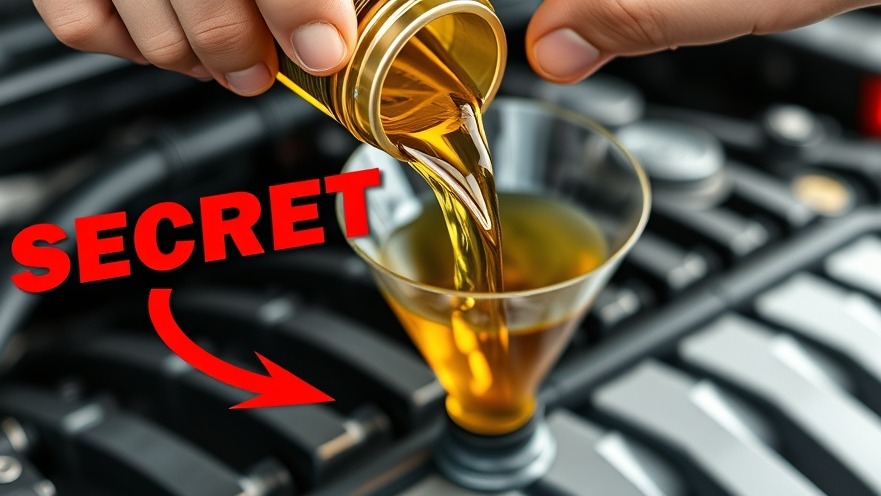
Understanding Why Proper Oil Changes Are Critical for Old Engines
Did you know that 98% of drivers are doing their oil changes incorrectly? Many car owners believe they are caring for their engines adequately, but neglecting a few critical steps can lead to significant issues like ticking, leaks, and premature engine wear. For auto owners, understanding the nuances of maintaining an aging engine is crucial if you want to keep it operating smoothly for years. In the video "Secret Oil Change TRICK to Keep OLD Engines Running Smooth," key strategies to ensure longevity and efficiency for older engines are discussed.
In "Secret Oil Change TRICK to Keep OLD Engines Running Smooth," the discussion dives into the essential care your engine needs, exploring key insights that sparked deeper analysis on our end.
The Importance of High Mileage Oil
One of the first tricks highlighted is the necessity of using high mileage oil, especially for vehicles that have surpassed the 100,000-mile mark. Regular oil just doesn’t cut it for older engines because, as motors age, components like seals and gaskets can harden and lose their integrity. High mileage oil, with its added seal conditioners and detergents, not only revitalizes aging components but also helps to clean out built-up carbon and sludge. The recommendation to avoid cheap, off-brand oils, and instead opt for trusted brands like Castrol GTX and Valvoline, can save you from higher maintenance costs down the line.
The Role of Zinc in Older Engines
Another crucial element in maintaining older vehicles is the addition of zinc additives for engines with flat tappet cams. Zinc compounds help protect against wear caused by the direct metal-to-metal contact in these cam designs. Many modern oils have reduced zinc levels due to emissions regulations, putting older engines at risk. Therefore, adding a zinc additive or choosing oils formulated with zinc can be a game-changer in extending engine life.
The Benefit of Engine Flushing
Many car owners overlook the importance of flushing their engines before an oil change. Over time, sludge can build up and make a solid oil change ineffective. Using engine flush products can help break down these residues and provide a cleaner base for new oil. However, it is vital that this step only be used on healthy engines to avoid dislodging large chunks of debris that can further damage the engine.
Pre-Filling Oil Filters: A Simple Yet Effective Trick
Have you ever considered pre-filling your oil filter before installation? This often-ignored step can prevent dry starts, which can cause irreparable harm to your engine. Filling the filter before screwing it on ensures that your engine receives lubrication immediately upon starting, thus protecting sensitive components during that critical moment.
Shortening Oil Change Intervals for Older Vehicles
Experts recommend changing oil more frequently for older engines than newer ones. While 3,000-mile intervals may seem excessive to some, it is essential to remember that older engines may create more combustion byproducts like soot and acid. These contaminants can deteriorate oil quality faster, requiring more frequent changes to maintain engine health.
Managing Oil Levels: Don’t Overfill!
It’s a common misconception that filling the oil to the maximum line is optimal. However, overfilling can lead to oil foaming and eventual crankshaft damage. To keep your engine safe, aim to fill just under the maximum line, allowing for oil expansion during operation.
Regular Maintenance: Simple Steps That Make a Difference
Lastly, it is essential to create regular maintenance routines, such as changing the drain plug washer during each oil change. This small step can prevent leaks that might seem insignificant but could ultimately cause bigger problems. Moreover, always wiping down the filter surface when replacing the oil filter can prevent disastrous leaks due to double gaskets or debris.
In summary, understanding and implementing these tricks can significantly impact the longevity and performance of your old engine. Don't fall into the trap of assuming that conventional oil changes are sufficient. Instead, take these expert suggestions to heart if you want to keep your car running smoothly for years to come.
So what's your next step? Consider making these changes the next time your engine gets serviced. You’ll be investing in the longevity and reliability of your vehicle. Plus, your engine will thank you for the careful attention!
 Add Row
Add Row  Add
Add 




Write A Comment